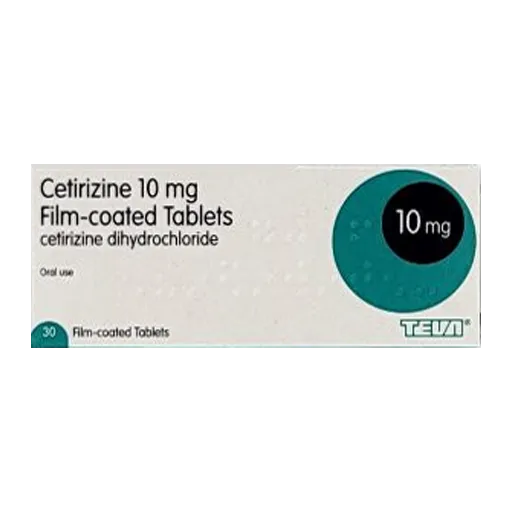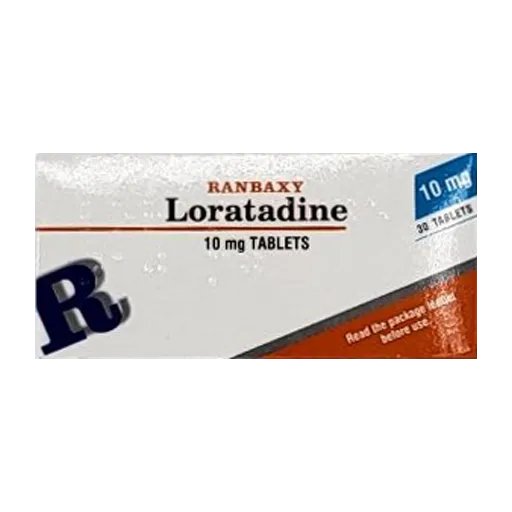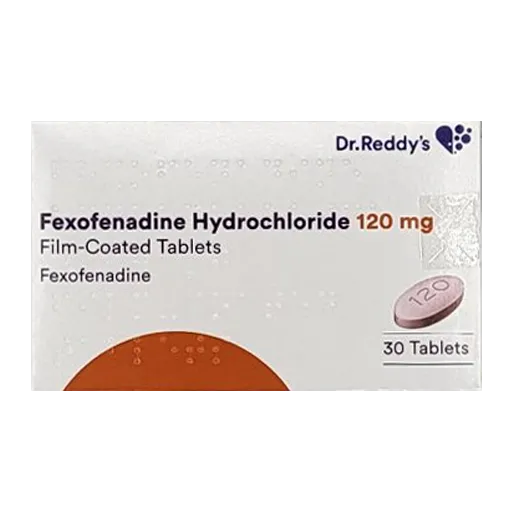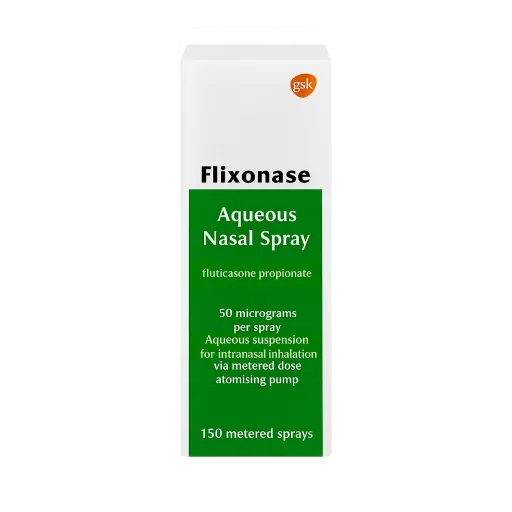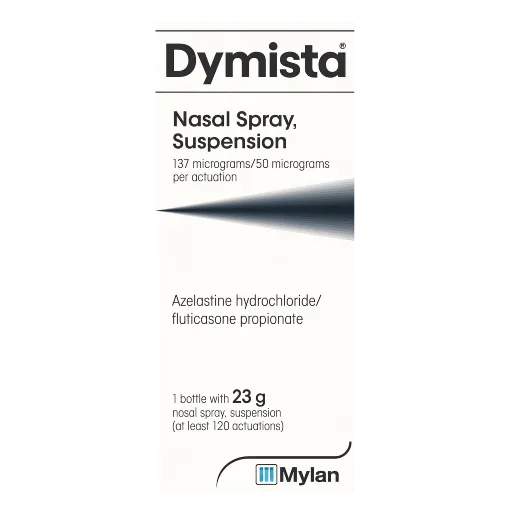
-
Next day delivery available
-
Genuine medication
-
Discreet packaging
Dymista Nasal Spray
What it is
Dymista Nasal Spray is a prescription-only treatment used to relieve symptoms of allergic rhinitis, including sneezing, runny or blocked nose, and nasal itching. It combines two active ingredients — azelastine hydrochloride, an antihistamine, and fluticasone propionate, a corticosteroid — to help control both immediate and longer-lasting allergic responses.
How it works
Dymista targets nasal allergies in two ways. Azelastine blocks histamine, a substance released during allergic reactions that causes itching, sneezing and a runny nose. Fluticasone reduces inflammation inside the nasal passages, helping to ease congestion and swelling. Working together, these ingredients provide rapid and sustained relief from hay fever and other airborne allergy symptoms.
How to use the spray
For adults and adolescents aged 12 years and over, the usual dose is one spray into each nostril twice daily (morning and evening). Use regularly for the best results. Shake the bottle well before each use and blow your nose gently beforehand. Prime the spray before first use or if it has not been used for more than 7 days. Do not exceed the recommended dose.
Who can use it?
Dymista Nasal Spray is suitable for adults and children aged 12 years and older who suffer from moderate to severe allergic rhinitis caused by pollen (hay fever) or indoor allergens such as dust mites or pet dander. It is not suitable for children under 12 years.
When should this spray not be used?
Do not use Dymista if you are allergic to azelastine, fluticasone, or any of the ingredients listed in the patient leaflet. Avoid using it if you have recently had nasal surgery or an untreated infection in your nose. Speak to your doctor before use if you have tuberculosis, an untreated infection, recent nasal injury, or any condition affecting your immune system.
Warnings & precautions
Use Dymista exactly as prescribed. Do not spray into the eyes or mouth. Long-term or excessive use of corticosteroid sprays may occasionally affect adrenal function or growth in children. If you use other steroid medicines (by mouth, injection, or inhaler), consult your doctor before starting Dymista. Always tell your prescriber about any other medicines you take, including over-the-counter or herbal products.
Possible side effects
Like all medicines, Dymista can cause side effects, though not everyone gets them. Common side effects include:
- Nasal irritation or burning
- Unpleasant taste or smell
- Headache
- Nosebleeds
Other side effects can include:
- Dryness of the nose or throat
- Sore throat
- Cough
- Dizziness
Other side effects can include:
- Drowsiness
- Dryness of the nose or throat
- Unpleasant smell
Rarely, allergic reactions such as rash, swelling or breathing difficulty may occur, stop using the spray and seek medical help immediately if these happen.
Drowsiness and driving
Dymista may cause mild drowsiness or fatigue in some people due to the antihistamine component. If you feel sleepy after using the spray, avoid driving, cycling, or operating machinery until you feel alert again. Avoid drinking alcohol as it can increase drowsiness.
Pregnancy & breastfeeding
Dymista is not generally recommended during pregnancy or while breastfeeding unless advised by a doctor. If you are pregnant, planning a pregnancy, or breastfeeding, speak to your GP or midwife before use to ensure it is appropriate for you.
Dymista vs Beclometasone vs Fluticasone
| Feature | Dymista Nasal Spray | Beclometasone Nasal Spray | Fluticasone Nasal Spray |
|---|---|---|---|
| Active ingredients | Azelastine (antihistamine) + Fluticasone (steroid) | Beclometasone dipropionate (steroid) | Fluticasone propionate or fluticasone furoate (steroid) |
| Type of medicine | Dual-action antihistamine and corticosteroid | Corticosteroid (anti-inflammatory) | Corticosteroid (anti-inflammatory) |
| Licensed use | Allergic rhinitis (hay fever and indoor allergies) | Allergic and non-allergic rhinitis | Allergic rhinitis (hay fever and perennial rhinitis) |
| Typical adult dose | 1 spray in each nostril twice daily | 1 or 2 sprays in each nostril twice daily (max 8 sprays/day) | 2 sprays in each nostril once daily (morning), or as prescribed |
| Onset of action | Fast - within a few hours | Slower - may take a few days to build effect | Slower - may take several days of regular use |
| Main benefit | Immediate antihistamine relief plus long-lasting steroid effect | Reduces nasal inflammation and swelling | Reduces inflammation and prevents allergy flare-ups |
| Prescription status | Prescription-only | Available on prescription and some lower strengths OTC | Available on prescription and some lower strengths OTC |
| Suitable for | Adults and children aged 12 years and over | Adults and children aged 6 years and over | Adults and children aged 4 years and over (varies by brand) |
| Drowsiness risk | Possible (due to antihistamine) | Unlikely | Unlikely |
| When preferred | When rapid relief is needed and symptoms are severe | When congestion or inflammation is the main problem | For long-term control of nasal allergy symptoms |
Which nasal spray is best for me?
The best nasal spray for you depends on the type and severity of your allergy symptoms. For mild or occasional hay fever, a single-ingredient corticosteroid spray such as Beclometasone or Fluticasone may be enough to control sneezing, itching, and congestion when used regularly.
If you have more severe or persistent symptoms, or if other sprays have not provided enough relief, Dymista Nasal Spray may be a better option. It combines a fast-acting antihistamine with a powerful steroid, helping to reduce symptoms quickly while maintaining long-term control of inflammation.
Your pharmacist or prescriber can help you decide which nasal spray is most suitable based on your medical history, other medications, and how your allergies affect you throughout the year.
Other nasal sprays we offer
If Dymista is not suitable for you, or if your symptoms are mild and controlled with a single active ingredient, our pharmacy offers several effective alternatives. These sprays target nasal inflammation and allergy symptoms in different ways:
- Mometasone Nasal Spray - a corticosteroid spray that helps reduce swelling and irritation caused by hay fever and perennial rhinitis.
- Flixonase Nasal Spray - contains fluticasone propionate to relieve sneezing, nasal congestion, and itching associated with allergic rhinitis.
- Avamys Nasal Spray - contains fluticasone furoate, designed for once-daily use to provide 24-hour relief from allergy symptoms.
- Beclometasone Nasal Spray - an effective corticosteroid option for reducing nasal inflammation and congestion due to hay fever or allergies.
More information
For full product details, see the Summary of Product Characteristics (SPC) and Patient Information
Leaflet on the EMC website.
For advice about managing hay fever and allergies, visit the NHS hay fever guidance.
-
How quickly does Dymista work?
Many people notice an improvement in symptoms within a few hours of using Dymista, but the full effect may take several days of regular use. Continue treatment as directed for consistent relief.
-
Can I use Dymista with other allergy medicines?
Yes, but you should check with your pharmacist or doctor first. Using multiple antihistamines together is usually unnecessary and can increase drowsiness. Saline sprays can be used alongside Dymista to help clear the nose.
-
Can I use Dymista every day?
Yes. Dymista can be used daily during allergy season or when symptoms are present. If your symptoms improve significantly, your doctor may suggest reducing the frequency or stopping treatment.
-
What should I do if I miss a dose?
If you miss a dose, use it as soon as you remember. If it’s nearly time for your next dose, skip the missed one — do not double the dose to make up for it.
